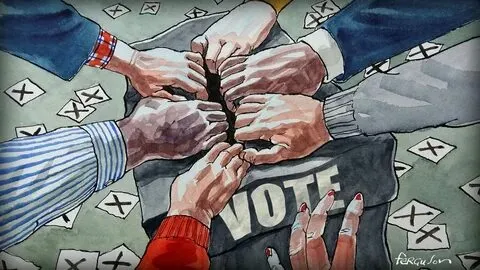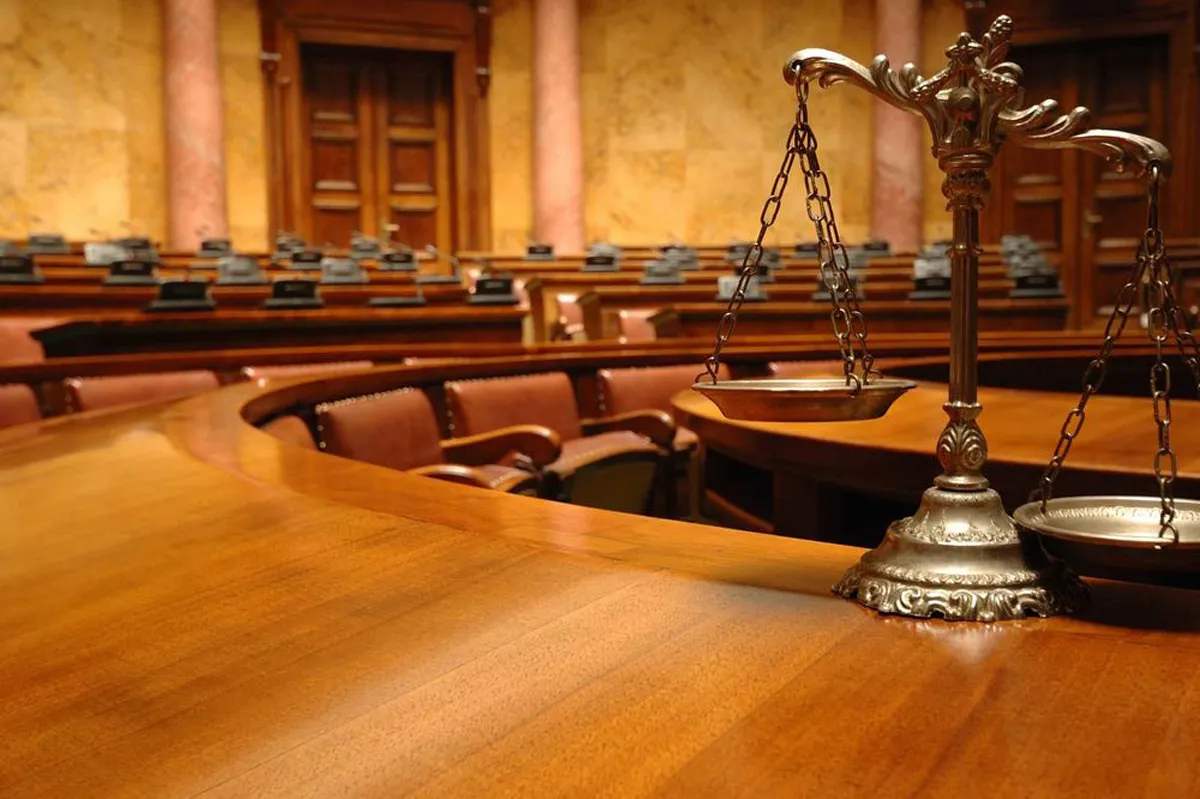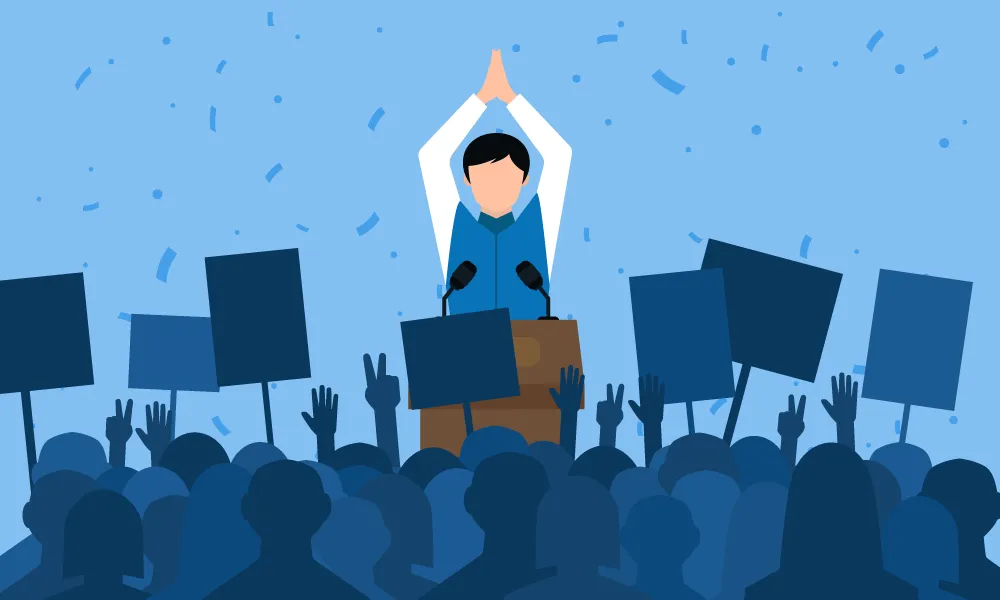Class 9 Political Science

Chapter 1 : What is Democracy and Why Democracy ?
The aim of this chapter is to examine the concept, understand the structural components, forms and features of democracy in different countries, with special on the government of India and North Korea.
Class 9 Political Science Chapter 1 : What is Democracy and Why Democracy ? NCERT PDF
Our Topics Links
Class 9 Political Science Chapter 1 : NCERT Question
(Latest CBSE Syllabus)
1 Here is some information about four countries. Based on this information, how would you classify each of these countries. Write ‘democratic’, ‘undemocratic’ or ‘not sure’ against each of these.
a Country A: People who do not accept the country’s official religion do not have a right to vote.
b Country B: The same party has been winning elections for the last twenty years.
c Country C: Ruling party has lost in the last three elections.
d Country D: There is no independent election commission.
2 Here is some information about four countries. Based on this information, how would you classify each of these countries. Write ‘democratic’, ‘undemocratic’ or ‘not sure’ against each of these.
a Country P: The parliament cannot pass a law about the army without the consent of the Chief of Army.
b Country Q: The parliament cannot pass a law reducing the powers of the judiciary.
c Country R: The country’s leaders cannot sign any treaty with another country without taking permission from its neighbouring country.
d Country S: All the major economic decisions about the country are taken by officials of the central bank which the ministers cannot change.
4 If you intend to visit Kavarati during your summer vacations which one of the following Union Territories of India you will be going to:
a People feel free and equal in a democracy.
b Democracies resolve conflict in a better way than others.
c Democratic government is more accountable to the people.
d Democracies are more prosperous than others.
4 Each of these statements contains a democratic and an undemocratic element. Write out the two separately for each statement.
a A minister said that some laws have to be passed by the parliament in order to conform to the regulations decided by the World Trade Organisation (WTO).
b The Election Commission ordered re-polling in a constituency where large-scale rigging was reported.
c Women’s representation in the parliament has barely reached 10 per cent. This led women’s organisations to demand one-third seats for women.
5 Which of these is not a valid reason for arguing that there is a lesser possibility of famine in a democratic country?
a Opposition parties can draw attention to hunger and starvation.
b Free press can report suffering from famine in different parts of the country.
c Government fears its defeat in the next elections.
d People are free to believe in and practise any religion.
6 There are 40 villages in a district where the government has made no provision for drinking water. These villagers met and considered many methods of forcing the government to respond to their need. Which of these is not a democratic method?
a Filing a case in the courts claiming that water is part of right to life.
b Boycotting the next elections to give a message to all parties.
c Organising public meetings against government’s policies.
d Paying money to government officials to get water.
7 Write a response to the following arguments against democracy:
a Army is the most disciplined and corruption-free organisation in the country. Therefore army should rule the country.
b Rule of the majority means the rule of ignorant people. What we need is the rule of the wise, even if they are in small numbers.
c If we want religious leaders to guide us in spiritual matters, why not invite them to guide us in politics as well. The country should be ruled by religious leaders.
8 Are the following statements in keeping with democracy as a value? Why?
a Father to daughter: I don’t want to hear your opinion about your marriage. In our family children marry where the parents tell them to.
b Teacher to student: Don’t disturb my concentration by asking me questions in the classroom.
c Employee to the officer: Our working hours must be reduced according to the law.
9 Consider the following facts about a country and decide if you would call it a democracy. Give reasons to support your decision. exercises Rationalised 2023-24 17 exercises
a All the citizens of the country have right to vote. Elections are held regularly.
b The country took loan from international agencies. One of the conditions for giving loan was that the government would reduce its expenses on education and health.
c People speak more than seven languages but education is available only in one language, the language spoken by 52 percent people of that country.
d Several organisations have given a call for peaceful demonstrations and nation wide strikes in the country to oppose these policies. Government has arrested these leaders.
e The government owns the radio and television in the country. All the newspapers have to get permission from the government to publish any news about government’s policies and protests.
10 In 2004 a report published in USA pointed to the increasing inequalities in that country. Inequalities in income reflected in the participation of people in democracy. It also shaped their abilities to influence the decisions taken by the government. The report highlighted that:
a If an average Black family earns $ 100 then the income of average White family is $ 162. A White family has twelve times more wealth than the average Black family.
b In a President’s election ‘nearly 9 out of 10 individuals in families with income over $ 75,000 have voted. These people are the top 20% of the population in terms of their income. On the other hand only 5 people out of 10 from families with income less than $ 15,000 have voted. They are the bottom 20% of the population in terms of their income.
c About 95% contribution to the political parties comes from the rich. This gives them opportunity to express their opinions and concerns, which is not available to most citizens.
d As poor sections participate less in politics, the government does not listen to their concerns – coming out of poverty, getting job, education, health care and housing for them. Politicians hear most regularly about the concerns of business persons and the rich.
Write an essay on ‘Democracy and Poverty’ using the information given in this report but using examples from India.

Chapter 2 : Constitutional Design
Lorem Ipsum is simply dummy text of the printing and typesetting industry. Lorem Ipsum has been the industry’s standard dummy text ever since the 1500s, when an unknown printer took a galley of type and scrambled it to make a type specimen book. It has survived not only five centuries, but also the leap into electronic typesetting, remaining essentially unchanged.
Class 9 Political Science Chapter 2 : Constitutional Design NCERT PDF
Our Topics Links
Class 9 Political Science Chapter 2 : NCERT Question
(Latest CBSE Syllabus)
1. Here are some false statements. Identify the mistake in each case and rewrite these correctly based on what you have read in this chapter.
a Leaders of the freedom movement had an open mind about whether the country should be democratic or not after independence.
b Members of the Constituent Assembly of India held the same views on all provisions of the Constitution.
c A country that has a constitution must be a democracy.
d Constitution cannot be amended because it is the supreme law of a country.
2 Which of these was the most salient underlying conflict in the making of a democratic constitution in South Africa?
a Between South Africa and its neighbours
b Between men and women
c Between the white majority and the black minority d Between the coloured minority and the black majority
3 Which of these is a provision that a democratic constitution does not have?
a Powers of the head of the state
b Name of the head of the state
c Powers of the legislature
d Name of the country
5 Read again the extracts from Nehru’s speech ‘Tryst with Destiny’ and answer the following:
a Why did Nehru use the expression “not wholly or in full measure” in the first sentence?
b What pledge did he want the makers of the Indian Constitution to take?
c “The ambition of the greatest man of our generation has been to wipe every tear from every eye”. Who was he referring to?
6 Here are some of the guiding values of the Constitution and their meaning. Rewrite them by matching them correctly.
a Sovereign i Government will not favour any religion.
b Republic ii People have the supreme right to make decisions.
c Fraternity iii Head of the state is an elected person.
d Secular iv People should live like brothers and sisters.
7 How did your school celebrate the Constitution Day on November exercises 26th? Prepare a brief report.
a Filing a case in the courts claiming that water is part of right to life.
b Boycotting the next elections to give a message to all parties.
c Organising public meetings against government’s policies.
d Paying money to government officials to get water.
8 Here are different opinions about what made India a democracy. How much importance would you give to each of these factors?
a Democracy in India is a gift of the British rulers. We received training to work with representative legislative institutions under the British rule.
b Freedom Struggle challenged the colonial exploitation and denial of different freedoms to Indians. Free India could not be anything but democratic.
c We were lucky to have leaders who had democratic convictions. The denial of democracy in several other newly independent countries shows the important role of these leaders.
10 Read the following statements about a constitution. Give reasons why each of these is true or not true.
a The authority of the rules of the constitution is the same as that of any other law.
b Constitution lays down how different organs of the government will be formed.
c Rights of citizens and limits on the power of the government are laid down in the constitution.
d A constitution is about institutions, not about values

Chapter 3 : Electoral Politics
Lorem Ipsum is simply dummy text of the printing and typesetting industry. Lorem Ipsum has been the industry’s standard dummy text ever since the 1500s, when an unknown printer took a galley of type and scrambled it to make a type specimen book. It has survived not only five centuries, but also the leap into electronic typesetting, remaining essentially unchanged.
Class 9 Political Science Chapter 3 : Electoral Politics NCERT PDF
Our Topics Links
Class 9 Political Science Chapter 3 : NCERT Question
(Latest CBSE Syllabus)
1. Which of the following statements about the reasons for conducting elections are false?
a Elections enable people to judge the performance of the government.
b People select the representative of their choice in an election.
c Elections enable people to evaluate the performance of the judiciary.
d People can indicate which policies they prefer.
2 Which of these is not a good reason to say that Indian elections are democratic?
a India has the largest number of voters in the world.
b India’s Election Commission is very powerful.
c In India, everyone above the age of 18 has a right to vote.
d In India, the losing parties accept the electoral verdict.
3 Match the following :
a It is necessary to keep the voters list up to date because i there is a fair representation of all
sections of our society
b Some constituencies are reserved for SCs and STs so that ii everyone has equal opportunity to elect
their representative
c Everyone has one and only one vote so that iii all candidates must have a fair chance
of competing in elections
d Party in power is not allowed to use government vehicles iv some people may have moved away
from the area where they voted last
5 Surekha is an officer in-charge of ensuring free and fair elections in an assembly constituency in a state. Describe what should she focus on for each of the following stages of election:
a Election campaign
b Polling day
c Counting day
6 The table below gives the proportion of different communities among the candidates who won elections to the US Congress. Compare these to the proportion of these communities in the population of the US. Based on this, would you suggest a system of reservations in the US Congress? If yes, why and for which communities? If no, why not?
| Proportion of the community (in percentage) in the | |
| House of Representatives | Population of US |
Blacks | 8 | 13 |
Hispanics | 5 | 13 |
Whites | 86 | 70 |
7 Can we draw the following conclusions from the information given in this chapter? Give two facts to support your position for each of these.
a Election Commission of India does not have enough powers to conduct free and fair elections in the country
b There is a high level of popular participation in the elections in our country.
c It is very easy for the party in power to win an election.
d Many reforms are needed to make our elections completely free and fair.
9 Here are some reports of electoral malpractices from different parts of the world. Is there anything that these countries can learn from India to improve their elections? What would you suggest in each case?
a During an election in Nigeria, the officer in charge of counting votes deliberately increased the votes of one candidate and declared him elected. The court later found out that more than five lakh exercises votes cast for one candidate were counted in favour of another.
Proportion of the community (in per cent) in the House of representatives
8 5 86 Population of US 13 13 70 Blacks Hispanics Whites exercises ELECTORAL POLITICS Rationalised 2023-24 54 DEMOCRATIC POLITICS him elected.
b Just before elections in Fiji, a pamphlet was distributed warning voters that a vote for former Prime Minister, Mahendra Chaudhry will lead to bloodshed. This was a threat to voters of Indian origin.
c In the US, each state has its own method of voting, its own procedure of counting and its own authority for conducting elections. Authorities in the state of Florida took many controversial decisions that favoured Mr. Bush in the presidential elections in 2000. But no one could change those decisions.
10 Here are some reports of malpractices in Indian elections. Identify what the problem in each case is. What should be done to correct the situation?
a Following the announcement of elections, the minister promised to provide financial aid to reopen the closed sugar mill.
b Opposition parties alleged that their statements and campaign was not given due attention in Doordarshan and All India Radio.
c An inquiry by the Election Commission showed that electoral rolls of a state contain name of 20 lakh fake voters.
d The hoodlums of a political party were moving with guns, physically preventing supporters of other political parties to meet the voters and attacking meetings of other parties.
11 Ramesh was not in class when this chapter was being taught. He came the next day and repeated what he had heard from his father. Can you tell Ramesh what is wrong with these statements?
a Women always vote the way men tell them to. So what is the point of giving them the right to vote?
b Party politics creates tension in society. Elections should be decided by consensus not by competition.
c Only graduates should be allowed to stand as candidates for elections.
